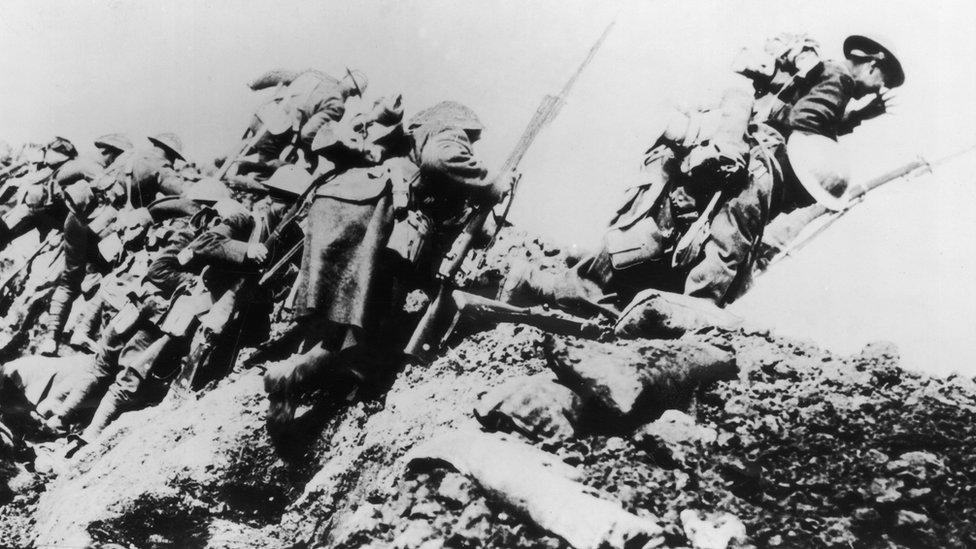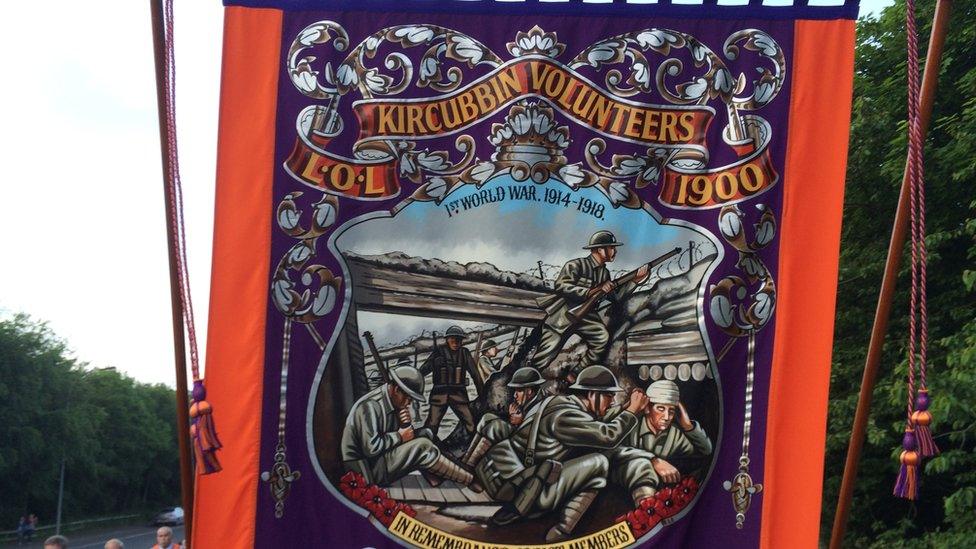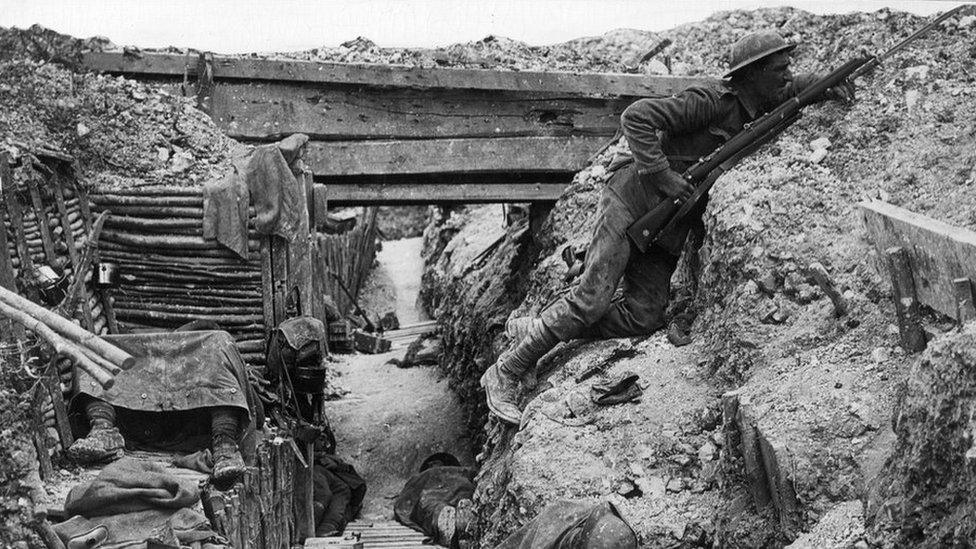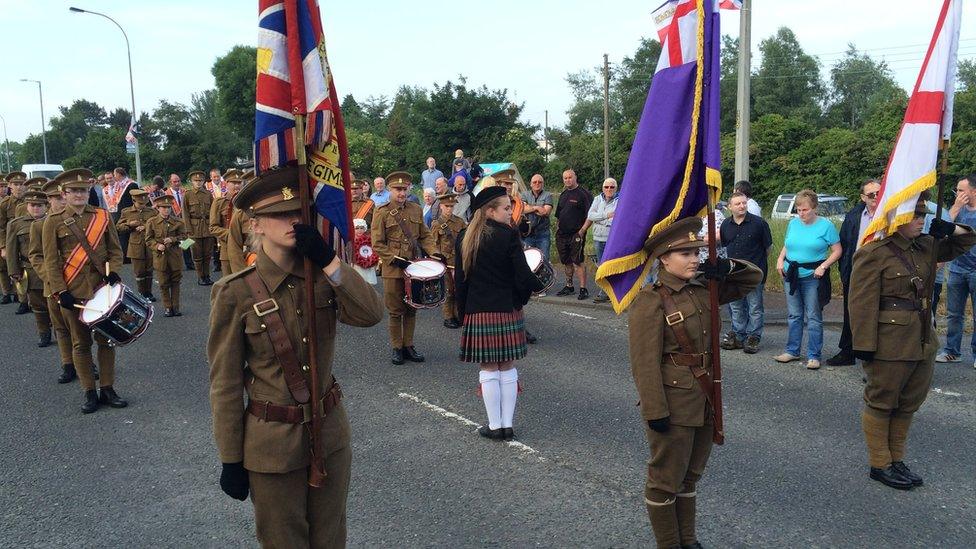The Somme: 'Orangeism's greatest triumph and its heaviest defeat'
- Published
Historian Dr David Hume said the Orangemens' cultural identity was important for them.
More than 200,000 men from across the world who fought during the First World War were members of the Orange Order, external, according to the institution.
The Battle of the Somme has been described as Orangeism's greatest triumph and its heaviest defeat.
At least five Orangemen were awarded the Victoria Cross for gallantry, including Robert Quigg from Bushmills for his outstanding bravery on the battlefield.
In an historical twist of fate, the Battle of the Somme commenced on the anniversary (according to the Julian calendar) of the other great battle at the heart of Orange identity, the Battle of the Boyne.

British troops climbing from their trench on the first day of 'The Big Push' on the Somme during World War One
Launch
At the launch of a Somme Exhibition at the Museum of Orange Heritage in Belfast, the Grand Master of the Grand Orange Lodge of Ireland Edward Stevenson said the Institution was "proud and honoured" to remember its fallen heroes of 1916.
"The Battle of the Somme will forever be seared into the psyche of Orangeism, given the huge sacrifice by members of the Institution on the front line.
"It is well documented that many Orangemen went over the top in the heat of the battle proudly wearing their collarettes or Orange ribbons on their uniforms, and never returned.
"In this context, the lily and the poppy are poignantly symbolic as the flowers of a generation lost in battle."

This World War One banner on display at a Somme Commemoration in Newtownards won Grand Lodge best new banner award 2014
Orange Order historian Dr David Hume said their cultural identity was important for the men in the trenches.
"There were different fraternities, there were Orange Lodges, there were Masonic lodges at the front, those would have given a sense of comfort to the individuals involved in them.
"The fact that it was the anniversary of the Battle of the Boyne I think carried very strong symbolism for them. I think it would have provided perhaps a strong sense of adrenalin that day.
"This was a very significant day in that they were all together as a division and I suppose this was their time to prove themselves."

A British soldier looks out over the front line from a trench
Orange Sash
One such story is attributed to Major George Gaffikin a company commander from west Belfast who is said to have urged on his men as they wavered by holding aloft his Orange sash and roaring the traditional war cry of the Boyne "Come on, Boys! No surrender."
There has been some debate about whether Major Gaffikin waved his collarette or a handkerchief, and whether anyone could have heard what he shouted over the din of battle.
In his book 'On The Road to the Somme: Men of the Ulster Division tell their story' historian Philip Orr quotes the account of Malcolm McKee:
"What nonsense is stuck onto the story....Certainly Major Gaffikin waved an orange handkerchief, but orange was the colour of our battalion....If he had said (and if anybody could have heard him) "Come on boys, this is the First of July!" - how many would have known that the Boyne was fought on the first of July?
"I don't know why they plaster such incidents on our battle. Nothing was further from my mind than the Boyne on the Somme."

Orange bands in traditional World War One style military uniforms
According to Philip Orr "'undoubtedly some men in the 36th Division did go over the top fortified by their political and religious views and some may even have worn their collarette or sash.
"However it is more in retrospect I think that the Somme and the Boyne began to be seen as part of the one grand saga of Ulster Protestant courage and sacrifice. especially as 1st July had been the 'old' date of the Battle of the Boyne."
'No surrender'
Captain Henry Gallaugher DSO, of 11th Battalion Royal Inniskilling Fusiliers who was present at the Somme on 1st July also suggests such accounts grabbed headlines in contemporary accounts of the battle.
In his diary, now in the archive of the Inniskillings Regimental Museum, he wrote:
"I see the papers talking about us shouting 'No surrender' and 'remember the Boyne'. Well it may be so but it did not occur near me and I was the leading platoon of our regiment.
"As a matter of fact there was no bravado about it. Everyone knew what was expected of him and quite realized that there was going to be casualties.
"The one idea was to get there and get there as quick as possible and we did."

British troops climbing from their trench on the first day of 'The Big Push' on the Somme during World War One
Protestants
Philip Orr said there was a tragic irony in that amongst the enemy troops on the other side of No Man's Land were many Protestants from South West Germany.
"On 1st July undoubtedly men from the 36th Division with strong reformation convictions killed and were killed by young Germans with equally strong Protestant values and heritage.
"That is the tragedy of it all. But then sadly the history of Europe and of our own islands has frequently featured Christians killing Christians - so perhaps we should not be surprised."
For many members of Orange Lodges the centenary of the Somme is a time to remember personal sacrifices.
Robert James McGreechan with a memorial banner to 5 men including his great uncle
Robert James McGreechan is named after a great uncle who was killed at the Somme and whose name is on a new banner created by Loughries True Blues LOL1948 to commemorate five brethren who were killed.
He said: "It's been a long tradition in our family, Orangemen and soldiers.
"I feel very proud about it all and I think that more people should be honoured in this way because it was a forgotten thing.
"It's been a hundred years but it has taken a hundred years to get to where we are now and he should have been honoured long before this."